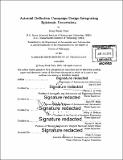Asteroid deflection campaign design integrating epistemic uncertainty
Author(s)
Paek, Sung Wook
DownloadFull printable version (34.26Mb)
Other Contributors
Massachusetts Institute of Technology. Department of Aeronautics and Astronautics.
Advisor
Olivier L. de Weck, David W. Miller, Jeffrey A. Hoffman and Richard P. Binzel.
Terms of use
Metadata
Show full item recordAbstract
Planetary defense, or asteroid collision avoidance, has been gaining interest with recent meteor or fly-by events, including the Chelyabinsk meteor that entered the Earth's atmosphere and exploded over Russia in 2013. Past or planned robotic missions to near-Earth asteroids are expected to provide an excellent opportunity to demonstrate asteroid deflection techniques. However, applying a deflection technique to a hazardous asteroid in real-world situations requires extreme care for decision makers due to inherent uncertainty. The forms of uncertainty can be epistemic or aleatoric. Epistemic uncertainty can be reduced by replenishing incomplete information with better observations, whereas stochastic uncertainty cannot be reduced owing to its randomness. Although we cannot reduce stochastic uncertainty itself, we can come up with a plan which is robust to random uncertainty, by reducing epistemic uncertainty. This thesis develops a methodology to design an asteroid deflection campaign that consists of multiple mission stages. The first stage serves as a precursor whose type can achieve different amounts of uncertainty reduction. With this in-situ information obtained by precursors, the follow-up stage may adapt its impactor design. The methodology is implemented in the Asteroid Deflection Integrating Epistemic Uncertainty (ADIEU) framework. The ADIEU framework is demonstrated in deflection campaigns of select near- Earth asteroids. Generation of campaign solutions over a 15-year period, with different confidence requirements, requires up to 125,000 full-factorial runs and 400 optimization runs per asteroid. Results show that campaigns which consider and reduce epistemic uncertainty can both decrease launch mass and increase robustness. However, there are also cases, under extreme conditions, where a single-stage mission turns out to perform best. The performance envelopes of these different approaches are superposed to generate a decision map for use as a visual aid. Finally, this thesis concludes by outlining future work to refine the framework, as well as potential uses of the methodology in terrestrial applications.
Description
Thesis: Ph. D., Massachusetts Institute of Technology, Department of Aeronautics and Astronautics, 2016. Cataloged from PDF version of thesis. Includes bibliographical references (pages 241-249).
Date issued
2016Department
Massachusetts Institute of Technology. Department of Aeronautics and AstronauticsPublisher
Massachusetts Institute of Technology
Keywords
Aeronautics and Astronautics.